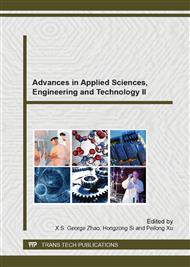[1]
J.H. Xie, Y. Li, Q.J. Zhang, Suggestion for logistic park of Caofeidian Pork development and construction, J. China Business. 35 (2011) 153-154. In Chinese.
Google Scholar
[2]
J.Z. Li, C.L. Liu, Y.P. Chang, etal, Integrated analysis of organization succession in cluster supply chain and the development of logistical park-the case of IT industry in Suzhou, J. China Soft Science. 1 (2006) 108-116. In Chinese.
Google Scholar
[3]
Y. Cui, J. Chen, Y.B. Xiao, Behavior inventory management review and prospects, J. Journal of Management Science in China. 7 (2010) 43-44. In Chinese.
Google Scholar
[4]
X.M. Qian, Optimization the distribution system path selection of logistics park, J. Pioneering with Science & Technology Monthly. 7 (2010) 43-44. In Chinese.
Google Scholar
[5]
L. Zhao, T. Li, Comprehensive performance evaluation index system and on development potential of logistics park, J. Journal of Tianjin University (Social Sciences). 15 (2013) 502-506. In Chinese.
Google Scholar
[6]
W. Fang, X.M. Li, Logistics park development strategies based on the theory of ecology, J. Productivity Research. 4 (2010) 180-181. In Chinese.
Google Scholar
[7]
J. Yao, Research on Logistics Transaction Mode Based on Symbiosis Theory, Southeast University Press, Nanjing, (2010).
Google Scholar
[8]
V. Ahmdajina, Symbiosis: an Introduction to Biological Association, University Press of New England, England, (1986).
Google Scholar
[9]
F.A.A. Boons, L.W. Baas, Types of industrial ecology: the problem of coordination, J. Journal of Cleaner Production. 5 (1997) 79-86.
DOI: 10.1016/s0959-6526(97)00007-3
Google Scholar
[10]
C.Q. Yuan, Symbiosis Theory-On Small Business, Economic Science Press, Beijing, 1998. In Chinese.
Google Scholar
[11]
H.Y. Ren, M. Sun. Analysis inter-enterprise collaborative of eco-industrial park in the evolutionary model. J. Statistics and Decision. 6 (2008) 166-167. In Chinese.
Google Scholar
[12]
L. Nan, Construction of port logistics symbiosis system model. J. Commercial Times. 1 (2010) 30-31. In Chinese.
Google Scholar
[13]
W. Jiao, K. Liu, On cooperation among logistics parks based on symbiosis theory, J. Productivity Research. 4 (2013) 102-105.
Google Scholar
[14]
H.B. Bu, P.L. Liu. Clusters of enterprises symbiosis evolution, ways, J. Productivity Research. 10 (2005) 231-233. In Chinese.
Google Scholar
[15]
Q.Y. Jiang, Mathematical Model, High Education Press, Beijing, (1998).
Google Scholar
[16]
W.Z. Wang, Q.M. Tan, X.D. Xu. A coordination evolution model of enterprises cluster based on Niche, J. Scientific Management Research. 5 (2005) 34-37. In Chinese.
Google Scholar


